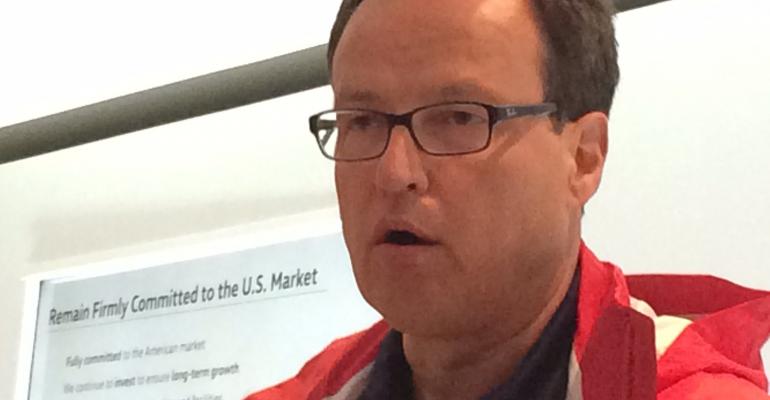SEATTLE – Volkswagen won’t reintroduce vehicles with diesel engines in the U.S. anytime soon, but more of its future products will come with all-wheel drive.
So says Hinrich Woebcken, the new president and CEO of the German automaker’s restructured North American unit.
The upcoming AWD offerings will include the ’17 Golf Alltrack introduced here at a media event and due in showrooms in October, a midsize SUV that comes out next year and then a redone Tiguan midsize CUV.
Although VW will not completely emulate Subaru by offering AWD on every vehicle in the lineup, more VWs will come with the driving-dynamic feature, Woebcken says. “You can see the shifting, although not to the entire lineup.”
An industry veteran, he joined VW this year and assumed his current post in March. Much of his assignment centers on helping VW find its way out of its diesel-emissions scandal. The German automaker admitted it put software in its TDI engines to deceive regulators, giving the misimpression the engines deliverred great fuel economy and performance but not at the expense of producing excess tailpipe emissions.
VW now is trying to work its way through the mess it created.
“We want to regain trust and rebuild the brand (following) the disappointment of TDI,” Woebcken says, taking a “do-the-right-thing” stance at the Alltrack debut.
“Not only customers were damaged, but also agreements with governments and agencies,” he says of the deception.
As part of its punishment and atonement, VW is paying out billions here and there, including up to $10 billion in a customer buyback and modification program, $2.7 billion for a trust, and $1.2 billion to dealers to cover costs they’ve suffered.
As it tries to put the scandal behind it, VW is intent on showing its commitment to the U.S. market.
“VW fully needs the U.S. market,” Woebcken says, noting the automaker employs 6,000 workers in America. “And that number will grow.”
In North America, the majority of VW workers – 14,000 – are at Mexican plants and engineering offices.
Of the American employees, many of them work at an assembly plant in Chattanooga, TN, where the Passat sedan is made. VW from 2015 to 2019 will invest $7 billion in North America, $900 million in Chattanooga, Woebcken says.
Other investments include a new Audi plant in Mexico, the expansion of the Puebla plant for the Tiguan long-wheel base and a new parts distribution center in Sacramento.
The Chattanooga plant is ramping up to make a new midsize SUV based on VW’s MQB platform. The 7-seater “is designed for the heart of the U.S. market,” Woebcken says. “It is tailored to the American lifestyle.”
The Mexican-made Golf Alltrack is the first new VW introduced since the diesel scandal broke. Dealers anxiously are awaiting the new product, and VW doubled planned production at their request, Woebcken says.
In his new role as head of the North American region, he also is focused on “bringing decision-making to the local level and being closer to dealers and customers.”
In the past, VW has been criticized for the strict centralization of its operations, with the home office in Germany calling the shots.
“The North American teams have more freedom and responsibility than ever before,” Woebcken says.
VW continues to sell vehicles with diesel engines outside the U.S., and Woebcken isn’t ruling out the possibility of the automaker someday reintroducing a diesel to America.
“It is not clear as to how we would bring back the diesel, but it would not be of the same magnitude as before,” he tells a group of journalists here.
He notes VW entered the U.S. market about 60 years ago with two vehicles: the Beetle car and the Transporter microbus, both of which became part of the U.S. culture.
“This brand had that special element,” he says. “People who bought VWs were part of a cool community. I believe that still exists. It is something other brands don’t have.”
Before arriving at VW, Woebcken spent three decades in manufacturing and sales while working for various auto suppliers and BMW. “I consider myself a car guy, but I also like the business end of it.”
As for the prospects of VW dusting itself off and making some money in the U.S., he says, “I’m very intensively working on it right now.”





